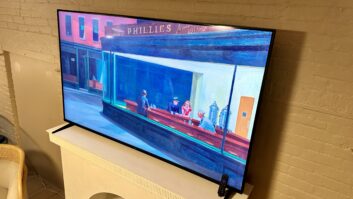Minneapolis – Although Best Buy reported earnings from continuing operations were better than anticipated, the retailer still recorded a $10 million drop in its fiscal first quarter, down about 13 percent, to $69 million, compared with $79 million in the year-ago period.
As reported earlier in June, Best Buy sales for the three months, ended May 31, jumped 11 percent, hitting $4.7 billion, up from $4.2 billion in the same quarter a year earlier (TWICE, June 9, p. 1). Comp-store sales increased 2.2 percent in the period.
“Earnings from continuing operations came in above our expectations, after the war in Iraq ended and increased consumer confidence during the quarter sent more shoppers to our stores and to our Web sites,” said Brad Anderson, vice chairman/CEO.
“The mid-single-digit gain in comparable store sales we enjoyed in May boosts our confidence in the sales outlook for our fiscal second quarter and for the rest of the fiscal year,” Anderson said.
With shoppers returning and the economic climate warming, Best Buy’s financial performance in the first quarter already is benefiting from the sale of its Musicland chain (see related story, below). The retailer recorded an impairment loss related to Musicland of $70 million, paired with a $24 million after-tax loss from operations, for a total first quarter loss from discontinued operations of $94 million, compared with $330 million in the same three months in 2002.
Best Buy consolidated gross profit for continuing operations dipped 30 basis points in the first quarter, to 25.4 percent, down from 25.7 percent year-on-year. The drop was attributed, in part, to an increase in promotional activity at U.S. Best buy stores.
Consolidated selling, general and administrative expenses (SG&A) climbed 30 basis points in the first three months, reaching 22.9 percent, up from 22.6 percent in the same three months a year earlier. This increase was driven by incremental depreciation costs related to investments to support strategic growth initiatives, one-time costs associated with moving the corporate headquarters and the de-leveraging impact of a modest comp-store sales gain.
These negative factors were partially offset by various initiatives launched last fall to increase efficiency. Gross profit margin in Best Buy’s domestic segment, which is comprised of the U.S. Best Buy and Magnolia Hi-Fi operations, dipped 20 basis points, to 25.5 percent in the first three months, reflecting consumer use of rebates and free financing. Higher promotional costs were partially offset by sales of higher margin digital products, mainly digital televisions. The segment reported operating income of $123 million in the first three months, down from $135 million year over year.
The SG&A rate for the chain’s domestic segment increased 40 basis points in the first quarter, to 22.6 percent, due primarily to increased depreciation costs, costs associated with moving the headquarters and the de-leveraging impact of the modest comp-store gain.
The International segment, comprised of Best Buy and Future Shop stores in Canada, reported flat comps and a 120-basis-point slide in gross profit, to 24.5 percent in the first quarter. SG&A improved 90 basis points, to 26.7 percent. The segment recorded a first quarter operating loss of $9 million, compared to a $6 million operating loss in the year-ago period.
Best Buy anticipates mid-single-digit comp-store sales gains for its second fiscal quarter, while gross margin remains relatively flat. The retailer also expects the SG&A rate to improve, although this will be partially offset by expenses associated with the development of various customer initiatives.
“We anticipate that increased consumer confidence, market share gains and easier comparable store sales comparisons vs. fiscal 2003 will drive higher comparable store sales gains in the second half of fiscal 2004,” said Darren Jackson, executive VP-finance/CFO.
Jackson said Best Buy estimated revenue growth of 11 percent to 13 percent and earnings growth of 14 percent to 16 percent for the full fiscal year, ended in February of 2004.












